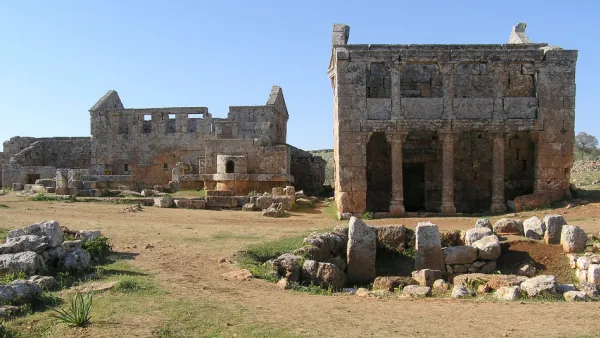Nate Berg reports on the new findings published by a team of Harvard researchers looking to uncover the genesis and shape of the world's first cities in "the Cradle of Civilization."
Archaeologist Jason Ur and Computer Scientist Bjoern Menz have just published their findings in this month's Proceedings of the National Academy of Sciences. Utilizing satellite imagery and a sophisticated program created to detect the remains of buildings and settlements through radiation, "[t]hey've mapped more than 14,000 settlement sites in a 23,000-square-kilometer region in northeastern Syria, and they suggest that their method can be used to map the entire region," writes Berg.
While UR and Menz found that, in general, those sites located in close proximity to water sources tended to be larger in size and had longer life-spans, they also found that, "not every early civilization made straightforward resource-based decisions about where to settle."
Perhaps it will be unsurprising for planners to learn, based on the last 10 years of intensive research on the origin of cities, that Ur concludes, "there's no one model for the city. There are any number of different approaches."
FULL STORY: Uncovering the World's First Cities

Analysis: Cybertruck Fatality Rate Far Exceeds That of Ford Pinto
The Tesla Cybertruck was recalled seven times last year.

National Parks Layoffs Will Cause Communities to Lose Billions
Thousands of essential park workers were laid off this week, just before the busy spring break season.

Retro-silient?: America’s First “Eco-burb,” The Woodlands Turns 50
A master-planned community north of Houston offers lessons on green infrastructure and resilient design, but falls short of its founder’s lofty affordability and walkability goals.

Test News Post 1
This is a summary

Analysis: Cybertruck Fatality Rate Far Exceeds That of Ford Pinto
The Tesla Cybertruck was recalled seven times last year.

Test News Headline 46
Test for the image on the front page.
Urban Design for Planners 1: Software Tools
This six-course series explores essential urban design concepts using open source software and equips planners with the tools they need to participate fully in the urban design process.
Planning for Universal Design
Learn the tools for implementing Universal Design in planning regulations.
EMC Planning Group, Inc.
Planetizen
Planetizen
Mpact (formerly Rail~Volution)
Great Falls Development Authority, Inc.
HUDs Office of Policy Development and Research
NYU Wagner Graduate School of Public Service



























